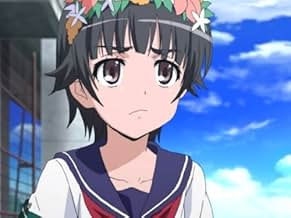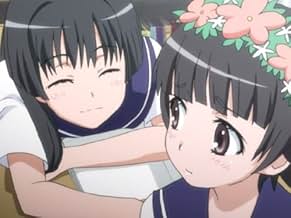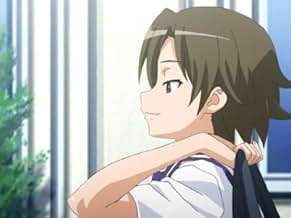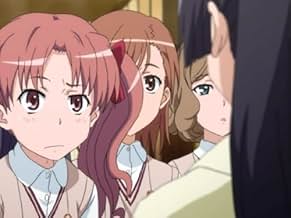En Toaru Kagaku no Railgun T, Mikoto Misaka y sus amigos se preparan para el Festival Daihasei, una competición deportiva de siete días entre diferentes escuelas de Esper, que, por supuesto,... Leer todoEn Toaru Kagaku no Railgun T, Mikoto Misaka y sus amigos se preparan para el Festival Daihasei, una competición deportiva de siete días entre diferentes escuelas de Esper, que, por supuesto, también incluye la escuela secundaria Tokiwadai.En Toaru Kagaku no Railgun T, Mikoto Misaka y sus amigos se preparan para el Festival Daihasei, una competición deportiva de siete días entre diferentes escuelas de Esper, que, por supuesto, también incluye la escuela secundaria Tokiwadai.
- Premios
- 2 premios ganados y 13 nominaciones en total
Explorar episodios
Argumento
¿Sabías que…?
- TriviaTodas las entradas contienen spoilers
Opinión destacada
I have to admit, I'm a bit conflicted about A Certain Scientific Railgun. On one hand, it features an interesting premise, has loveable characters, a truly excellent English dub, and some pretty nice story arcs. On the other hand, the premise quickly runs into problems with realism, the character development is flawed, and some other story arcs meander along in absolute triviality.
Interesting from a production level is that (at this) there are three seasons spanning more than a decade. The first one, from 2009/2010, is also easily the most flawed season. While there are some pretty cool and cohesive episodes around at the mid-season finale and season finale, the majority of the first season is quite boring and inconsequential. The cast is pretty much limited to the main four characters, action scenes are rare, the whole 'superpower' premise is criminally underutilised, but it still makes for a reasonably good show for older kids or young teens.
The second season, from 2013/2014, pretty quickly launches into a fairly gruesome story arc that contains a surprising amount of blood and violence. I did not expect to see anything like it in a show that seemed so kid-friendly in its first season, though I suppose there may be cultural differences between Japan and more westernised countries that make this more common for Japanese audiences. The second season is an overall coherent string of episodes, unlike the individual plots of the first season, and the cast is expanded a bit with both support characters and antagonists. I did find the later episodes much weaker than the first arc, however.
The third season, from 2020, again launches quickly into a coherent plot that is quite serious for a children's show. The initial story arc is easily the best so far, with a surprisingly emotional highlight in episodes ten and fifteen. The latter arc is just as good, and the season finale makes for a solid ending for the entire series. The cast is expanded quite a bit, though for some reason the second-most important character of the first two seasons barely plays a role anymore
The premise of the series is interesting: Academy City consists of mostly teenaged students, many of whom (the 'espers') have special abilities. There is a surprising lack of adult oversight (and, for some reason, parents are entirely out of the picture). Lawkeeping is mostly made up of teenagers in 'Judgement', though there is also a para-military police force that is pretty useless most of the time.
The cast revolves around Mikoto Misaka, who is one of the most powerful espers. Her friends include Kuroko Shirai, a Judgement officer who also madly crushes on Misaka, and the more support-character-esque Uiharu and Saten (who I'm sure have first names as well, not that anyone cares). The portrayal of Shirai's crush on Misaka is pretty strange by western standards but (I guess) a bit of a trope in anime; while overall pretty tame for an anime, this avenue is what is used to implement some fan service and oversexualise teenage girls. Sure, I guess. It is a good thing that this cast expands in the later seasons; the antagonists especially are often surprisingly multi-faceted.
I was very impressed by the English voice cast. Pretty much all of the voices are solid, but the protagonist (Brittney Karbowski) really does a fantastic job.
Overall, I'd call A Certain Scientific Railgun an excellent series if it were a bit more consistent and certain of its target audience. Large parts of it (alongside the general premise, cast, and rare oversexualisation) are geared towards a younger audience, but then suddenly far more mature topics and ethical questions pop up, including personal identity, assisted suicide, medical experimentation, government corruption and apathy, mind control, child experimentation, ...
Nevertheless, I wouldn't mind watching a fourth season, though I'm a bit afraid that the cast has blown up so much that another few years between seasons would make it incomprehensible to newcomers, while the original audience has aged out of the genre.
Interesting from a production level is that (at this) there are three seasons spanning more than a decade. The first one, from 2009/2010, is also easily the most flawed season. While there are some pretty cool and cohesive episodes around at the mid-season finale and season finale, the majority of the first season is quite boring and inconsequential. The cast is pretty much limited to the main four characters, action scenes are rare, the whole 'superpower' premise is criminally underutilised, but it still makes for a reasonably good show for older kids or young teens.
The second season, from 2013/2014, pretty quickly launches into a fairly gruesome story arc that contains a surprising amount of blood and violence. I did not expect to see anything like it in a show that seemed so kid-friendly in its first season, though I suppose there may be cultural differences between Japan and more westernised countries that make this more common for Japanese audiences. The second season is an overall coherent string of episodes, unlike the individual plots of the first season, and the cast is expanded a bit with both support characters and antagonists. I did find the later episodes much weaker than the first arc, however.
The third season, from 2020, again launches quickly into a coherent plot that is quite serious for a children's show. The initial story arc is easily the best so far, with a surprisingly emotional highlight in episodes ten and fifteen. The latter arc is just as good, and the season finale makes for a solid ending for the entire series. The cast is expanded quite a bit, though for some reason the second-most important character of the first two seasons barely plays a role anymore
The premise of the series is interesting: Academy City consists of mostly teenaged students, many of whom (the 'espers') have special abilities. There is a surprising lack of adult oversight (and, for some reason, parents are entirely out of the picture). Lawkeeping is mostly made up of teenagers in 'Judgement', though there is also a para-military police force that is pretty useless most of the time.
The cast revolves around Mikoto Misaka, who is one of the most powerful espers. Her friends include Kuroko Shirai, a Judgement officer who also madly crushes on Misaka, and the more support-character-esque Uiharu and Saten (who I'm sure have first names as well, not that anyone cares). The portrayal of Shirai's crush on Misaka is pretty strange by western standards but (I guess) a bit of a trope in anime; while overall pretty tame for an anime, this avenue is what is used to implement some fan service and oversexualise teenage girls. Sure, I guess. It is a good thing that this cast expands in the later seasons; the antagonists especially are often surprisingly multi-faceted.
I was very impressed by the English voice cast. Pretty much all of the voices are solid, but the protagonist (Brittney Karbowski) really does a fantastic job.
Overall, I'd call A Certain Scientific Railgun an excellent series if it were a bit more consistent and certain of its target audience. Large parts of it (alongside the general premise, cast, and rare oversexualisation) are geared towards a younger audience, but then suddenly far more mature topics and ethical questions pop up, including personal identity, assisted suicide, medical experimentation, government corruption and apathy, mind control, child experimentation, ...
Nevertheless, I wouldn't mind watching a fourth season, though I'm a bit afraid that the cast has blown up so much that another few years between seasons would make it incomprehensible to newcomers, while the original audience has aged out of the genre.
- glumski
- 1 abr 2023
- Enlace permanente
Selecciones populares
Inicia sesión para calificar y agrega a la lista de videos para obtener recomendaciones personalizadas
Detalles
- Fecha de lanzamiento
- País de origen
- Sitio oficial
- Idiomas
- También se conoce como
- A Certain Scientific Railgun
- Productoras
- Ver más créditos de la compañía en IMDbPro
- Tiempo de ejecución24 minutos
- Color
- Mezcla de sonido
- Relación de aspecto
- 1.78 : 1
Contribuir a esta página
Sugiere una edición o agrega el contenido que falta

Principales brechas de datos
What is the Spanish language plot outline for To aru kagaku no rêrugan (2009)?
Responda

































